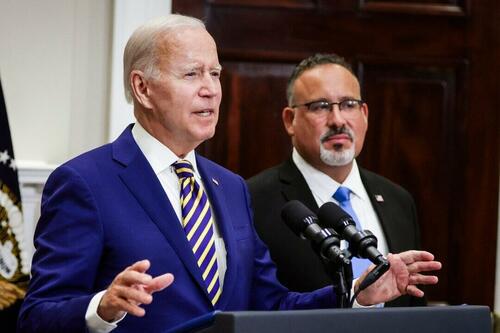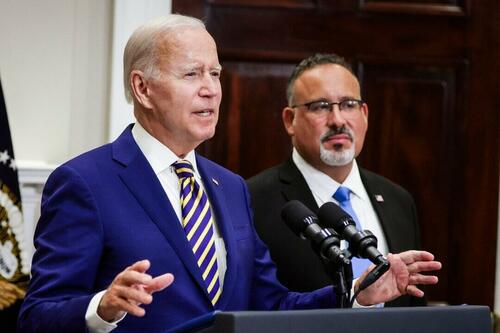
Appeals Court Blocks Key Parts Of Biden’s Student Loan Relief Plan
Authored by Tom Ozimek via The Epoch Times,
A federal appeals court has issued an order blocking key parts of the federal government’s Saving on a Valuable Education (SAVE) student loan forgiveness plan, replacing an earlier temporary administrative stay with an injunction that lays out specific prohibitions that will remain in force until the court issues a final ruling on the matter or until the Supreme Court intervenes.

The Eighth Circuit Court of Appeals on Aug. 9 ruled against the Department of Education’s (DOE) student loan forgiveness plan, largely granting an injunction requested by seven GOP-led states of a district court order that they say didn’t go far enough in blocking the program.
The SAVE plan, which aimed to lower monthly payments for millions of borrowers and speed up loan forgiveness for some, has been a point of contention since its introduction, drawing legal challenges from several states.
The latest order halts key aspects of the program while the legal battle continues.
The Eighth Circuit’s partial injunction prohibits the Biden administration from forgiving any principal or interest on loans under the SAVE plan, blocks provisions that would prevent interest from accruing on loans, and disallows borrowers from making very low or $0 monthly payments based on their income.
The federal government is “enjoined from any further forgiveness of principal or interest, from not charging borrowers accrued interest, and from further implementing SAVE’s payment-threshold provisions,” the judges wrote. The injunction will remain in effect until further order of the Eighth Circuit or the U.S. Supreme Court, the judges stated.
An initial ruling by a district court in Missouri partially blocked the SAVE plan but allowed other key parts to continue. The Eighth Circuit Court noted in its Aug. 9 order that the government adapted to the district court ruling by creating a hybrid plan that continued loan forgiveness in a different form, effectively undermining the district court’s injunction.
The hybrid plan meant that the lower court’s injunction only delayed loan forgiveness from 10 to 20 years and that borrowers could still get their loans fully forgiven after 20 years, even if they’ve made zero payments each month.
The Biden administration appealed the district court injunction, while the coalition of Republican-led states cross-appealed, seeking an expanded injunction. In response, the Eighth Circuit issued a decision on July 18 that granted the states’ emergency motion for an administrative stay, temporarily halting the implementation of the entire SAVE plan.
The Eighth Circuit then ruled on Aug. 9 to replace the administrative stay with a superseding injunction, siding with the district court’s finding that the plaintiffs have a “fair chance” of winning their argument on the merits because the sheer magnitude of the Biden administration’s debt relief plan.
Estimated to forgive around $475 billion in student loans, the SAVE plan likely exceeds the scope of congressionally authorized income-driven repayment plans.
The partial injunction only blocks the more controversial parts of the SAVE plan, such as faster forgiveness and non-accrual of interest, while allowing the federal government to continue offering income-driven repayment options to borrowers, just under stricter terms. The judges recognized that some aspects of the SAVE Plan, which were challenged as overreach, may exceed the government’s authority. However, other elements are within the permissible scope of income-driven repayment programs authorized by Congress.
Education Secretary Miguel Cardona issued a statement expressing opposition to the appellate court’s decision.
“I strongly disagree with the Eighth Circuit’s decision blocking our Administration’s SAVE plan,” he said in a post on X, adding that borrowers currently enrolled in the program will be placed in an interest-free forbearance, the details of which would be announced by the DOE in the coming days.
Missouri Attorney General Andrew Bailey voiced support for the decision to grant an injunction.
“This court order is a stark reminder to the Biden–Harris Administration that Congress did not grant them the authority to saddle working Americans with $500 billion in someone else’s Ivy League debt,“ he said in a statement. ”This is a huge win for every American who still believes in paying their own way.”
Despite the injunction, the federal government can still implement the broader structure of income-driven repayment under the SAVE plan, meaning that borrowers can still make payments that are calculated based on their income and family size.
Further, the injunction indicates that all borrowers currently impacted by the Eighth Circuit Court’s administrative stay are allowed to remain in administrative forbearance and are thus not required to pay principal or interest on their loans. Also, borrowers who have remained in PAYE and REPAYE plans are not impacted, and the coalition of states that challenged the SAVE plan “cannot turn back the clock on any loans that have already been forgiven.”
Another federal judge in Kansas had also blocked parts of the SAVE plan. However, a different federal appeals court, the Denver-based 10th Circuit Court of Appeals, put part of that decision on hold. A group of Republican-led states have asked the U.S. Supreme Court to reinstate that injunction.
In an earlier emailed statement to The Epoch Times, a DOE spokesperson said that Congress gave the department the authority to define the terms of income-driven repayment plans in 1993 and that the SAVE plan is the fourth time the agency has used that authority.
The spokesperson added that the Biden administration “won’t stop fighting to provide support and relief to borrowers across the country—no matter how many times Republican elected officials try to stop us.”
The Education Department said recently that it had already granted $5.5 billion to 414,000 borrowers through the SAVE plan.
The administration has estimated that the program would cost taxpayers around $156 billion over a decade, while Republican attorneys general argued that its true cost will amount to around $475 billion.
The Eighth Circuit wrote in its Aug. 9 decision that a budget model by the Wharton School of the University of Pennsylvania estimated that the program would cost $475 billion, while siding with the Kansas district court’s finding that the Biden administration’s expansion of the income-driven repayment plans from a program costing roughly $15 billion to $475 billion “expands agency authority to such an extent that it alters it.”
Tyler Durden
Sun, 08/11/2024 – 11:40

 1 rok temu
1 rok temu















